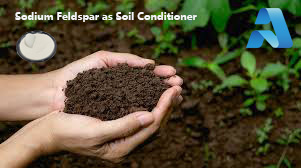With the continuous pursuit of high efficiency and environmental protection in modern agriculture, the research and application of soil conditioners have become an important means to improve land productivity and crop quality. Recently, a soil conditioner derived from natural minerals, sodium feldspar, has shown great potential in improving soil quality and promoting sustainable agricultural development with its unique physical and chemical properties.

Sodium feldspar is a silicate mineral composed of sodium, aluminum, silicon and other elements. It is rich in various nutrients such as sodium, potassium, silicon, etc. In addition, sodium feldspar also contains trace amounts of rare earth elements and other trace elements, which are essential for the growth and development of plants. As a soil conditioner, sodium feldspar plays a multiple role in agricultural production.
- First, sodium feldspar can significantly adjust the pH of the soil. Soil pH is one of the key factors affecting plant growth. If the soil is too acidic or too alkaline, the plant roots will have difficulty absorbing nutrients, which will affect plant growth and yield. The sodium element rich in sodium feldspar can effectively neutralize the acidity or alkalinity of the soil, keeping it within a suitable pH range and providing a good soil environment for plant growth.
- Secondly, sodium feldspar can improve the soil structure and improve the soil’s air permeability and water retention. Sodium feldspar powder is fine and porous. Adding it to the soil can increase the water storage capacity of the soil, improve the structure of the soil, make it more loose, and facilitate the penetration of oxygen and water. This is not only beneficial to the growth of plant roots and nutrient absorption, but also improves soil fertility and increases plant yield and quality.
- In addition, sodium feldspar provides plants with the nutrients they need. Elements such as sodium, potassium, and silicon are indispensable and important elements for plant growth. Sodium feldspar is rich in these elements and can meet the needs of plant growth and development. In particular, silicon element can improve the stress resistance of plants and enhance their ability to resist pathogenic bacteria and insect pests, making plants stronger and yielding higher yields.

From the analysis of advantages, sodium feldspar has a series of characteristics and potentials that cannot be ignored as a soil conditioner. These characteristics not only help to improve agricultural production efficiency, but also have important significance for environmental protection and resource recycling.
- First, sodium feldspar has a wide range of sources, which provides a solid foundation for its wide application in agriculture. As a common mineral, sodium feldspar is widely distributed in the earth’s crust, especially in some specific geological environments. This means that compared with other soil improvement materials that may need to be imported or specially mined, the cost of sodium feldspar is relatively low, thereby reducing the economic threshold for farmers to use this material for soil improvement.
- Second, the application process of sodium feldspar is simple and very friendly to ordinary farmers. Traditional soil improvement methods often require complex technical operations or special equipment, which is a challenge for many farmers who lack professional knowledge and technology. However, sodium feldspar can be applied directly to the field in the form of powder, which is simple and easy to operate and does not require additional professional training or large-scale machinery assistance. In addition, it is well compatible with existing agricultural practices and will not change farmers’ existing farming patterns, making sodium feldspar easier to accept and integrate into daily farming activities.
- Furthermore, the improvement of soil quality brought by sodium feldspar is long-lasting and stable. Sodium Feldspar can maintain the health of the soil by slowly releasing mineral elements, while enhancing the cation exchange capacity (CEC) of the soil, making it more capable of retaining water and nutrients. This long-lasting effect means that a one-time application of sodium feldspar can continue to improve soil conditions for several years or even longer, reducing subsequent investment costs and ensuring the stability of the crop growth environment.
- Finally, the use of sodium feldspar promotes the recycling of agricultural waste and industrial by-products. With the increase of environmental awareness and the emphasis of society on sustainable development, how to effectively deal with various types of waste has become an urgent problem to be solved. Sodium feldspar slag is one of the wastes generated in the mining process and is usually regarded as a worthless by-product. However, through proper processing of these slags, they can be converted into valuable soil conditioners. This process not only reduces the pressure of waste on the environment, but also creates new economic growth points and maximizes the use of resources.
As a pioneer in the industry, Henan Ankai New Materials Co., Ltd. is committed to the research and development and production of sodium feldspar modifiers, and is constantly exploring the best application solutions under different soil conditions. Through cooperation with scientific research institutions, Ankai New Materials has not only improved the performance of its products, but also actively promoted the widespread application of sodium feldspar modifiers in actual agricultural production.



